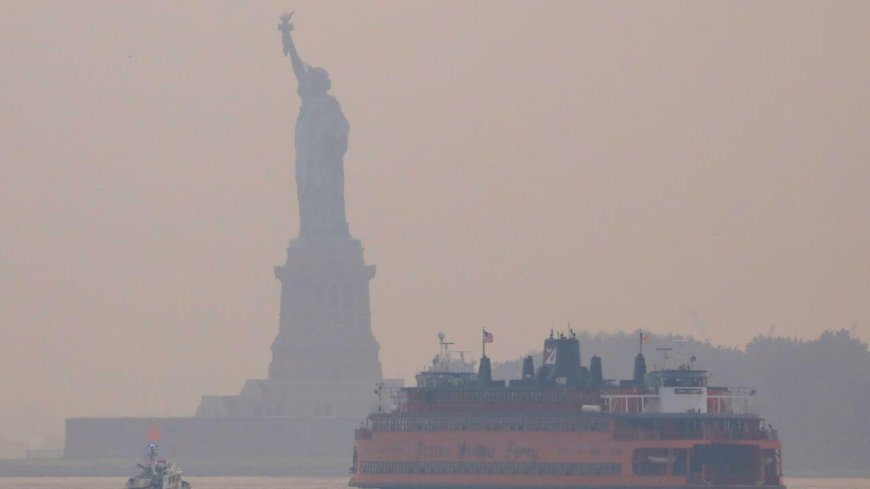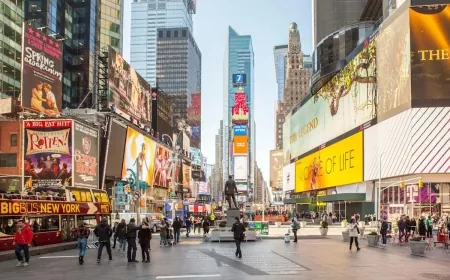New York Chokes on Unprecedented Smog Crisis as Global Air Pollution Worsens
New York City battles severe smog crisis while global air pollution escalates. Discover the alarming impact of wildfires and climate change on urban environments.

New York City finds itself in the grip of an unprecedented smog crisis as a thick blanket of smoke from wildfires raging in Canada engulfs the metropolis. The alarming levels of air pollution have left residents struggling to cope with an unfamiliar and severe environmental challenge.
Images of New York City shrouded in smoke have stunned the entire United States, prompting authorities to issue air quality alerts along the East Coast. The situation has led to a resurgence in the use of N95 face masks, a precautionary measure largely abandoned since the COVID-19 pandemic. Concerned citizens have taken to social media to share photos of the "apocalyptic" scenes and provide tips on minimizing health risks.
While such scenes are rare in the United States outside of West Coast states like California that experience annual wildfires, there are cities across Asia where battling smog has become a distressing norm. These major urban centers regularly face intense air pollution resulting from noxious smoke, harmful gases, and industrial chemicals. Unfortunately, this could become the new reality for many cities worldwide as the climate crisis continues to worsen.
According to the IQAir monitoring network, six of the world's ten most polluted cities were located in India last year. Researchers have estimated that the hazardous air quality in India could reduce the life expectancy of hundreds of millions of people by up to nine years. Shockingly, air pollution was attributed to nearly 1.6 million deaths in the country in 2019 alone.
New Delhi, India's capital, is notorious for being regularly shrouded in smog due to various contributing factors such as vehicle emissions, coal-fired power plants, and the common practice of burning agricultural fields to prepare the land for the next crop cycle. Consequently, the residents of New Delhi are exposed to high levels of fine particulate matter known as PM2.5—a widely recognized indicator of harmful air pollution. Inhalation of this tiny pollutant can have severe health implications, including asthma and cardiovascular diseases, as it can penetrate deep into lung tissue and even enter the bloodstream.
Now, New York City finds itself facing similar risks as PM2.5 levels hit an alarming peak of 303.3 micrograms per cubic meter. In stark contrast, the World Health Organization guidelines recommend an annual average level of just 5 micrograms per cubic meter. Comparatively, London recorded a measurement of 9.4 micrograms per cubic meter, while Hong Kong measured 21 micrograms per cubic meter, both well within the "good" range as per IQAir.
Cities in Southeast Asia are also well-acquainted with the disruptive consequences of air pollution, particularly during the annual stubble-burning season when farmers set fire to leftover straw stubble after grain harvests. In 2019, Malaysia faced such severe pollution that over 400 schools were forced to close as dozens of students fell ill and experienced vomiting due to the hazardous air quality. Additionally, large-scale forest fires in nearby Indonesia have frequently caused Malaysia to be enveloped in dense haze, leading to respiratory issues for many.
More recently, Chiang Mai, a city in northern Thailand, earned the undesirable distinction of being the world's most polluted city for an entire week in April. The severe pollution resulted from forest fires and crop burning in neighboring regions, leading to a surge in respiratory-related medical cases and overwhelming local hospitals.
Among the cities grappling with air pollution, Beijing stands out as a notable example of progress. The Chinese capital has long been plagued by acrid air, culminating in the infamous "air-pocalypse" in 2013 when the air quality index skyrocketed to 755—far surpassing the supposed upper limit of 500. This hazardous situation forced residents to confine themselves indoors, wear filtered face masks, and rely on air purifiers at full blast. The incident garnered global attention and pushed the issue of air pollution into the mainstream in China. Subsequently, the country embarked on a comprehensive anti-pollution campaign, which involved the closure of coal mines and plants, the establishment of nationwide air monitoring stations, and the implementation of new regulations.
Although challenges persist, Beijing has witnessed a significant improvement in air quality. In 2021, the city recorded its best monthly air quality since records began in 2013, and current photographs depict mostly clear blue skies.
While Beijing's progress offers a glimmer of hope, scientists and experts caution that cities, including those with typically good air quality such as New York, cannot escape the mounting challenges ahead. The human-induced climate crisis has exacerbated the hot and dry conditions that fuel wildfires. Recent scientific findings link millions of acres scorched by wildfires in the United States and Canada—a region equivalent in size to South Carolina—to carbon pollution from major fossil fuel and cement companies.
Canadian Prime Minister Justin Trudeau acknowledged "the devastating impacts of climate change" following a discussion with U.S. President Joe Biden regarding efforts to combat the Quebec fires. The haunting image of the United Nations building barely visible through the orange smog serves as a stark reminder of world leaders' failure to adequately address the climate crisis, as noted by scientist and climate advocate Lucky Tran. The tangible effects of this global crisis are now being experienced firsthand by the people of New York and the East Coast.
Also Read: Sluggish Growth in U.S. Services Sector and Record Low Prices Paid: Insights from ISM Survey

































































